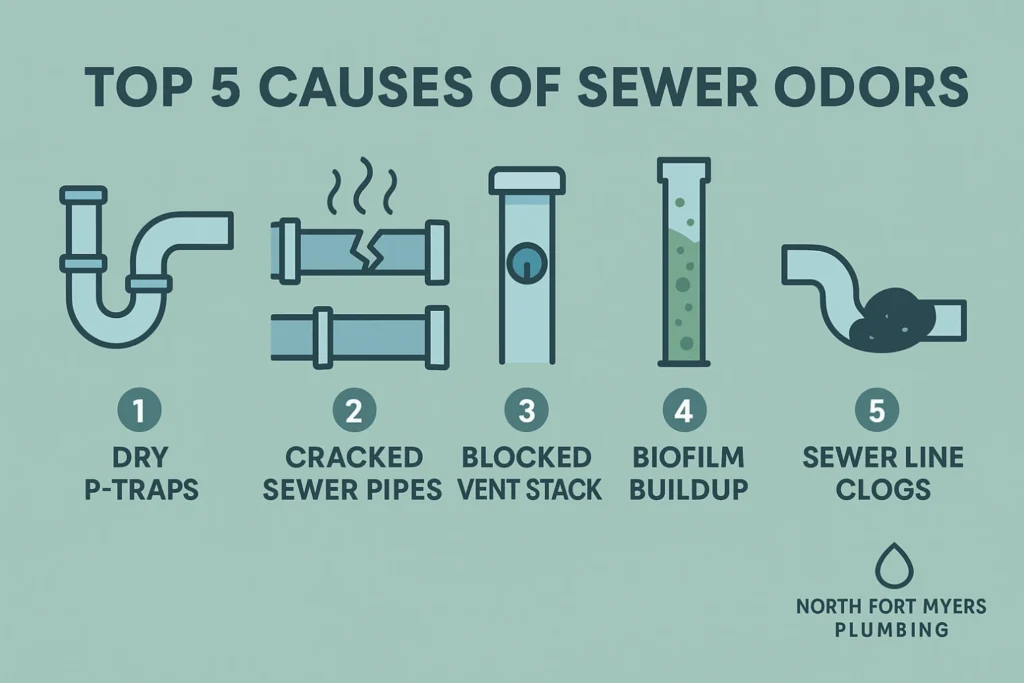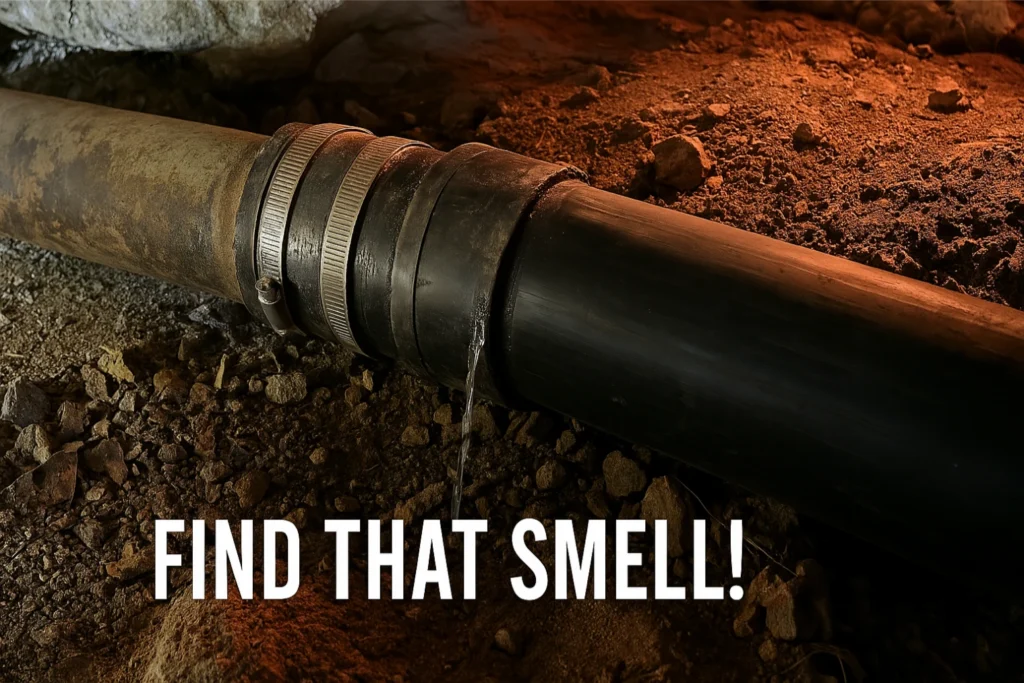Understanding and Resolving Sewer Odors in Your Home
Many homeowners experience unpleasant sewer odors that disrupt comfort and health. At North Fort Myers Plumbing Inc. we help residents solve these issues promptly. We understand that sewer odors can harm indoor air quality and cause irritation. We provide clear advice to diagnose and remedy odor problems effectively. North Fort Myers Plumbing Inc. uses advanced tools such as a Superior Signal Smoke Blower to trace hidden leaks.
Understanding Sewer Odors
What Is Sewer Gas?
Sewer gas contains compounds like hydrogen sulfide, methane, and ammonia. These gases form when organic waste decomposes in sewer systems rapidly. They produce a distinctive rotten-egg smell that many residents recognize immediately. For more details on the composition and impact of these gases, please refer to the US EPA Indoor Air Quality Basics. Proper plumbing traps normally prevent these gases from entering living areas.
How Sewer Odors Affect Your Home
Sewer odors damage indoor air quality and disrupt your family’s comfort significantly. They cause headaches, nausea, and respiratory irritation in some individuals. According to the CDC/NIOSH Hydrogen Sulfide, low-level exposure can trigger these symptoms. These unpleasant smells reduce property value and disturb peaceful living environments. We advise homeowners to act quickly when they notice persistent sewer odors.
The Science Behind the Smell
Organic waste decomposes rapidly and releases volatile compounds inside pipes. Increased temperature and high humidity accelerate these chemical reactions significantly. These reactions produce a strong, noticeable odor that alerts residents immediately. We educate homeowners that slight system changes can alter smells noticeably. Scientific principles explain the persistent odor patterns in faulty plumbing systems.

Common Causes of Sewer Odors in the Home
Dry or Faulty P-Traps
P-traps hold water that blocks sewer gases from escaping indoors effectively. When water evaporates, the trap loses its protective seal rapidly. Frequent use of fixtures prevents water from evaporating too quickly. We advise running water regularly to maintain a proper water barrier. Proper maintenance of P-traps stops odors and protects indoor air quality.
Compromised Toilet Seals
Toilet seals rely on wax rings to prevent sewer gas leakage effectively. A damaged wax ring creates gaps that let foul gases escape into the room. You may observe water pooling around the toilet base when seals fail. Replacing worn wax rings restores the seal and stops odor leaks effectively. Homeowners must inspect toilet seals regularly to ensure proper function.
Clogged or Dirty Drains
Drains often accumulate hair, soap, and organic debris over time. This natural buildup decomposes and produces a strong, unpleasant odor quickly. Homeowners must diligently clean drains frequently to prevent odor-causing clogs. We recommend using eco-friendly drain cleaners for safe and effective maintenance. Regular drain cleaning protects indoor air and preserves plumbing integrity.
Blocked or Damaged Vent Pipes
Vent pipes expel sewer gases outside to maintain proper air circulation. Debris, leaves, or animal nests often block these critical pipes unexpectedly. We advise checking vent pipes regularly for any signs of obstruction. Regularly clearing vents ensures that sewer gases escape safely outdoors. Proper vent maintenance significantly reduces indoor odor issues.

Structural Sewer Line Issues
Cracks and leaks in sewer lines allow gases to escape into your home quickly. Tree roots and aging pipes damage the sewer infrastructure gradually over time. We always recommend professional inspections to detect hidden structural issues early. Repairing sewer lines promptly prevents further damage and odor spread effectively. Homeowners must address structural faults quickly for lasting odor control.
Below is a chart that summarizes common causes of sewer odor, their indicators, and effective prevention tips. This visual aid helps you quickly review key factors to maintain a healthy plumbing system.
| Cause | Indicator/Sign | Prevention Tip |
|---|---|---|
| Dry or Faulty P-Trap | No water seal in drains, leading to odor leakage | Run water regularly in all fixtures |
| Compromised Toilet Seal | Water pooling around the toilet base or a wobbly toilet | Inspect and replace wax rings promptly |
| Clogged or Dirty Drains | Slow drainage and unpleasant decomposing smells | Clean drains frequently using eco-friendly cleaners |
| Blocked or Damaged Vent Pipes | Odors escaping indoors, especially near roof vents | Inspect and clear vent pipes of debris |
| Structural Sewer Line Issues | Hidden leaks or cracks leading to persistent odor | Schedule professional inspections and timely repairs |
Diagnosing the Source of Sewer Odors
DIY Inspection Techniques
You can inspect plumbing traps and seals on your own with simple tests. We recommend pouring water into drains to check the trap’s water level. Observe the toilet base for dampness or pooling water after flushing. Use a flashlight to inspect dark, hidden areas around pipes carefully. Simple tests help you detect issues early before they worsen significantly.
Professional Diagnostic Methods
You should call a professional if you cannot diagnose the problem yourself. Experts use camera inspections and pressure tests to locate faults accurately. We also deploy a Superior Signal Smoke Blower for effective smoke testing. Smoke testing quickly reveals leaks and other issues in the drainage system. Professional diagnostics provide clear results that guide timely repairs efficiently.
Interpreting the Findings
Analyze the inspection results with a focus on fault severity carefully. Compare DIY findings thoroughly with professional diagnostic data for clarity. Identify specific areas that require immediate repair and expert attention. Discuss the results with a trusted plumbing professional for guidance. We guide homeowners through the repair process using clear, actionable insights.
Preventative Maintenance and Remedies
Routine Plumbing Maintenance
Schedule regular plumbing inspections at least twice every calendar year. Clean drains and vents frequently to remove debris and buildup efficiently. Use only eco-friendly cleaning products that protect your plumbing system. We encourage homeowners to perform these tasks consistently for long-term benefits. Regular maintenance helps you avoid costly repairs and persistent odors.
Upgrading Plumbing Components
Replace outdated plumbing parts with modern, durable components regularly. Upgrade your wax rings and P-traps for improved odor control consistently. We advise investing in reliable fixtures that last longer and work better overall. Modern components offer better seals and reduce maintenance needs significantly. For further guidance on upgrading, consult the University of California Cooperative Extension Sewer Gas in Homes: Health and Safety Guidelines.
Behavioral Practices for Prevention
Always dispose of waste properly and avoid flushing non-degradable items. Limit grease and chemical use to prevent pipe blockages and damage seriously. We educate your family about proper plumbing usage every day. We encourage creating household rules that promote responsible waste disposal immediately. Behavioral changes help preserve your plumbing system and prevent odors effectively.
3 Practical Tips
Tip 1: Maintain Your Water Seal
Run water in every fixture each day to maintain a strong water seal reliably. This practice prevents the water in P-traps from evaporating too quickly. Consistent water flow blocks sewer gases from entering indoor spaces effectively. We urge homeowners to run water periodically even in seldom-used fixtures. Maintaining water seals reduces odor risks and enhances overall plumbing efficiency.
Tip 2: Use Eco-Friendly Cleaners
Use a mixture of baking soda and vinegar for routine drain cleaning each time. This eco-friendly solution dissolves organic buildup without harming your pipes. It protects your plumbing system while keeping the environment safe and clean. We recommend these cleaners for regular maintenance and effective odor control. Using eco-friendly cleaners enhances plumbing longevity and promotes indoor air quality robustly.
Tip 3: Monitor Your Plumbing Regularly
Inspect your entire plumbing system periodically to catch issues early and accurately. We advise homeowners to document any changes in drain performance and odors carefully. Regular monitoring helps you plan timely maintenance and necessary repairs promptly. Schedule professional inspections when you notice unusual behavior in the system consistently. Proactive monitoring preserves plumbing integrity and prevents unexpected odor problems effectively.
Frequently Asked Questions (FAQ)
What are the most common signs that my plumbing is causing sewer odors?
You notice a persistent rotten-egg odor in frequently used areas. Water often pools around the toilet base after flushing. Sinks and showers drain very slowly and emit foul odors consistently. You may observe damp areas or small leaks around fixtures often. We suggest contacting a professional when these signs appear repeatedly.
How can I tell if my P-trap is dry or malfunctioning?
Inspect your drain by pouring water into the fixture regularly. A dry P-trap loses its water seal quickly and emits noticeable odors. Observe if sewer gases enter the room when the fixture remains unused for long periods. Listen for unusual sounds or air movement near the drain. We advise scheduling a professional inspection if you suspect a malfunction.
When should I call a professional plumber to inspect my sewer odor issues?
Call a professional if you notice persistent and strong sewer odors in your home. Multiple fixtures showing slow drainage indicate deeper plumbing problems. We recommend professional diagnostics when DIY tests yield inconclusive results. Leaks, dampness, and unusual sounds require prompt expert evaluation immediately. We advise contacting North Fort Myers Plumbing for thorough inspections and repairs.
Can the use of certain cleaning products worsen sewer odor problems?
Some harsh chemicals can damage plumbing components and worsen odors significantly. Strong acids may corrode seals and cause leaks in pipes rapidly. We strongly recommend using mild, eco-friendly cleaners for safe maintenance consistently. Avoid prolonged exposure to corrosive substances on your plumbing surfaces. We advise homeowners to choose cleaners that protect and preserve plumbing health carefully.
Wrap-Up Insights
We explored the causes of sewer odors and effective diagnostic methods thoroughly. I provided clear, practical advice for maintenance and component upgrades reliably. Homeowners benefit from understanding and addressing these common plumbing issues proactively. We encourage you to act promptly and seek expert guidance when necessary. North Fort Myers Plumbing remains ready to assist with a Superior Signal Smoke Blower.
- Chloramine in Lee County Water: Understanding Its Impact on Rubber Gaskets, Water Heater Elements, and Plumbing Lifespan. - December 4, 2025
- Plumbing Durability for SWFL Rental Properties: Choosing Fixtures and Systems That Withstand High-Occupancy Wear and Tear - November 25, 2025
- Flo Smart Leak Protection for Cape Coral & Fort Myers Seasonal Homes - November 18, 2025